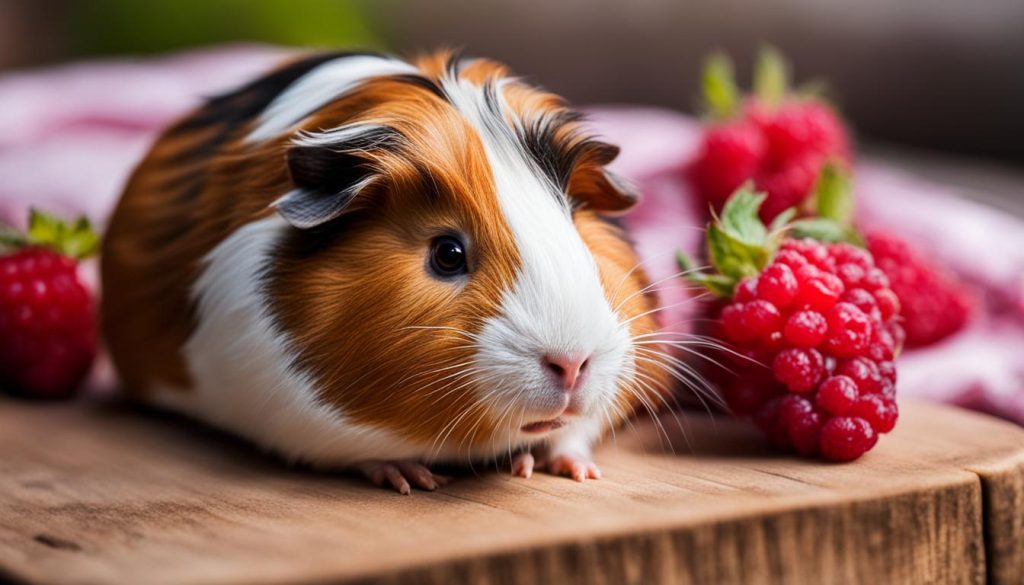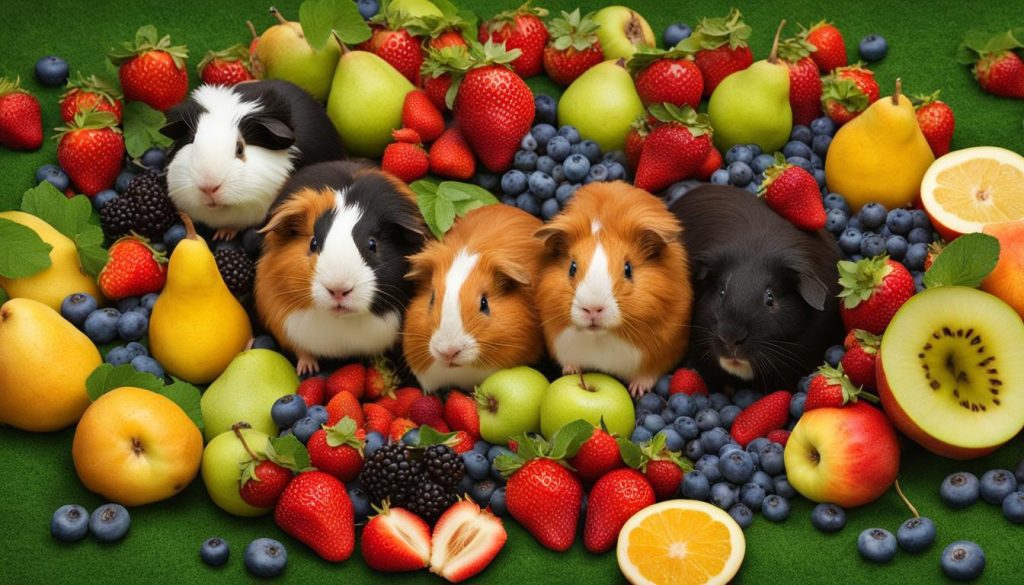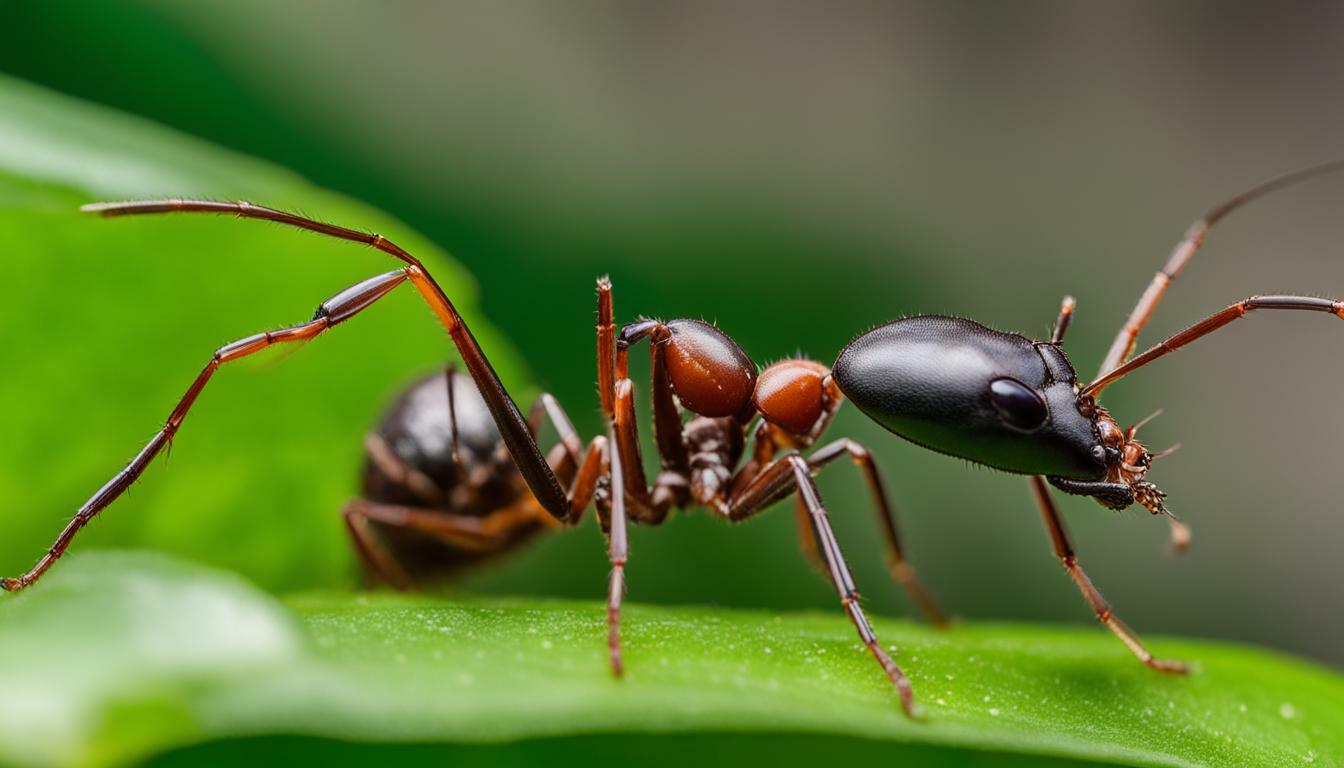As a guinea pig owner, you may be curious about which fruits are safe and healthy for your furry friend. One popular fruit that often sparks interest is raspberries. But can guinea pigs eat raspberries? Let’s delve into this topic and find out!
Raspberries can provide some essential nutrients for guinea pigs, such as vitamin C, iron, and phosphorus. These nutrients are crucial for their overall health and wellbeing. However, it’s important to note that raspberries should be fed in moderation due to potential drawbacks.
Can Guinea Pigs Eat Raspberries? Yes, in small amounts, they can.
- Raspberries can be safely fed to guinea pigs in small amounts.
- Raspberries contain vitamin C, iron, and phosphorus, which are beneficial for guinea pig health.
- Feeding raspberries in moderation is essential due to their high fiber and calcium content.
- Raspberries should only be given as an occasional treat and should not replace the main components of a balanced guinea pig diet.
- Consulting with a veterinarian is always recommended to ensure your guinea pig’s nutritional needs are met.
Nutritional Benefits of Raspberries for Guinea Pigs
When it comes to the health of our guinea pigs, their diet plays a crucial role. And while we all know that hay, vegetables, and pellets are essential, incorporating fruits like raspberries can provide some amazing nutritional benefits. Let’s explore the reasons why raspberries are a great addition to your guinea pig’s diet.
Vitamins in Raspberries: Raspberries are packed with vitamins, including vitamin A, vitamin C, and vitamin K. Vitamin C is especially important for guinea pigs, as they cannot produce it naturally like humans can. Including raspberries in their diet ensures that they receive this vital nutrient, which helps with their overall health and immune system.
Antioxidants in Raspberries: Raspberries are rich in antioxidants, which protect the cells in our guinea pigs’ bodies from damage caused by free radicals. These antioxidants help boost their immune system and prevent various diseases, keeping our furry friends healthy and happy.
Raspberries also contain other beneficial components like fiber, potassium, and folacin. Fiber aids in digestion and helps maintain a healthy gut, while potassium supports heart health and folacin plays a role in cell growth and development.
Remember to offer raspberries in moderation to avoid any potential risks associated with overconsumption. One or two raspberries, once or twice a week, make for a great treat for your guinea pigs. As with any new food, it’s important to observe them for any adverse reactions.
With their irresistible taste and impressive nutritional profile, raspberries are a wonderful addition to your guinea pig’s diet. Just remember to prioritize variety and balance in their overall meal plan, ensuring that they receive all the necessary nutrients for optimal health. A happy and healthy guinea pig starts with a nutritious diet!
Potential Risks of Feeding Your Guinea Pig Raspberries
While raspberries have nutritional benefits, there are potential risks associated with feeding them to guinea pigs. It’s important to be aware of the risks to ensure the health and well-being of your furry friend.
Raspberries contain xylitol, a natural sweetener that is safe for humans but can be harmful to guinea pigs. Xylitol can cause a drop in blood sugar levels and lead to hypoglycemia in guinea pigs. This can result in weakness, lethargy, and even seizures.
In addition to xylitol, raspberries also have high levels of calcium. While calcium is essential for guinea pigs, excessive intake can lead to urinary issues and the formation of bladder stones. It’s crucial to maintain a balance when incorporating raspberries into your guinea pig’s diet.
Furthermore, raspberries are rich in fiber. While fiber is generally beneficial for guinea pigs, an excessive amount can cause digestive upset and diarrhea. It is important to introduce raspberries gradually and observe your guinea pig’s digestive system for any adverse reactions.

While raspberries offer nutritional benefits, guinea pig owners need to be cautious about the potential risks associated with feeding these fruits. Monitoring serving sizes, avoiding excessive consumption, and observing your guinea pig’s behavior and health are key to keeping them safe and healthy.
How to Feed Raspberries to Your Guinea Pig
When feeding raspberries to your guinea pig, it is important to do so in moderation to ensure their health and well-being.
Raspberries can be a tasty treat for your guinea pig, but it is essential to limit the serving size. Offer only one or two raspberries at a time to prevent overconsumption.
It is best to provide raspberries as an occasional treat, once or twice a week. This frequency ensures that your guinea pig receives the nutritional benefits of raspberries without any adverse effects from consuming them too frequently.
Before introducing raspberries to your guinea pig’s diet, start with a small amount and observe their reaction. Look for any signs of digestive upset or allergies. If your guinea pig shows any adverse reactions, discontinue feeding them raspberries immediately and consult a veterinarian.
Remember that raspberries should not replace the main components of your guinea pig’s diet. A balanced diet for your guinea pig includes hay, fresh vegetables, and guinea pig pellets. These provide the necessary nutrients and fiber for their overall health and well-being.
When feeding raspberries to your guinea pig, remember to:
– Serve them in moderation
– Limit the serving size to one or two raspberries
– Offer them as a treat once or twice a week
– Start with a small amount and observe your guinea pig’s reaction
– Ensure a balanced diet with hay, vegetables, and pellets as the main components
Other Fruits That Guinea Pigs Can Eat
In addition to raspberries, there are many other fruits that guinea pigs can safely enjoy as part of their diet. These fruits not only provide variety in their meals but also serve as healthy treats. Just like with raspberries, it’s important to offer fruits in moderation, as they should make up less than 5% of a guinea pig’s diet. Additionally, avoid giving dried fruits or fruits with lots of seeds to your furry friend.
Here are some examples of safe and nutritious fruits for guinea pigs:
- Small wedges of orange or apple: Guinea pigs can nibble on small pieces of these citrusy and juicy fruits. Just remember to remove any seeds before offering them.
- A few blueberries: These tiny berries are packed with antioxidants and can be a refreshing treat for your guinea pig.
- A thin slice of banana: The natural sweetness of bananas makes them a tasty option for guinea pigs. Just make sure to give them small slices to avoid overindulgence.
- Kiwis: These fuzzy fruits are a great source of vitamin C and can add a delightful tang to your guinea pig’s diet. Slice a small piece for them to enjoy.
- Strawberries: These vibrant berries are not only delicious but also rich in vitamins and antioxidants. Offer a small portion to your guinea pig for a delightful treat.
- Citrus fruits: You can also give your guinea pig small amounts of citrus fruits like oranges, mandarins, or tangerines. These fruits are high in vitamin C and can be a refreshing addition to their diet.
Remember to always introduce new fruits gradually and monitor your guinea pig for any digestive issues or adverse reactions. Providing a diverse and balanced diet for your furry friend is essential for their overall health and well-being.

Wrapping Up
After considering the nutritional benefits and potential risks of feeding raspberries to guinea pigs, it is clear that these delicious fruits can be incorporated into their diet in moderation. By offering one or two raspberries once or twice a week as a treat, you can provide your furry friend with essential nutrients without exposing them to the potential hazards of overconsumption. However, it is crucial to remember that raspberries should be a part of a balanced diet that includes hay, vegetables, and pellets as the main components.
Keeping your guinea pig healthy and thriving requires more than just the right treats. It is important to consult with a veterinarian to ensure that you are providing a well-rounded and balanced diet specific to your guinea pig’s individual needs. A vet can offer expert guidance and advice to ensure that your guinea pig is receiving all the necessary nutrients and maintaining optimal health.
By feeding your guinea pig raspberries responsibly and seeking professional guidance, you can keep them happy and healthy for years to come. Remember, moderation is key when it comes to introducing new foods to your furry friend’s diet. So go ahead, offer them some raspberries, and enjoy watching the joy they bring to their little faces.
Conclusion
It is safe for guinea pigs to eat raspberries, but it is important to do so in moderation. Raspberries provide valuable nutritional benefits, particularly vitamin C. However, they also come with risks due to their high fiber, calcium, and xylitol content. Therefore, it is crucial to feed raspberries in small amounts and monitor your guinea pig for any adverse reactions.
Remember, maintaining a balanced and varied diet is essential for the overall health and well-being of your guinea pig. Raspberries should only be given as an occasional treat, along with a diet consisting mainly of hay, vegetables, and pellets. If you have any concerns or questions about your guinea pig’s diet, it is always best to consult with a veterinarian.
While guinea pigs can enjoy the occasional taste of raspberries, it’s important to prioritize their overall dietary needs. Providing a well-rounded, nutritious diet will help ensure that your guinea pig remains happy and healthy for years to come.
FAQ
Can guinea pigs eat raspberries?
Yes, guinea pigs can eat raspberries, but in very small amounts.
What are the nutritional benefits of raspberries for guinea pigs?
Raspberries are low in unhealthy fats and rich in vitamins A, C, and K, fiber, potassium, and folacin. They provide essential nutrients, especially vitamin C, which is important for guinea pig health.
Are there any risks associated with feeding guinea pigs raspberries?
Yes. Raspberries contain xylitol, which can cause a drop in blood sugar levels and hypoglycemia in guinea pigs. They also have high levels of calcium and fiber, which can lead to urinary issues and digestive upset if consumed in large quantities.
How should I feed raspberries to my guinea pig?
It’s important to feed raspberries in moderation. Limit the serving size to one or two raspberries, and offer them once or twice a week as a treat. Start with a small amount and observe your guinea pig for any adverse reactions before increasing the serving size.
Are there other fruits that guinea pigs can safely eat?
Yes, guinea pigs can safely eat other fruits such as small wedges of orange or apple, a few blueberries, a thin slice of banana, kiwis, strawberries, and citrus fruits. Remember to offer fruits in moderation and avoid dried fruits or fruits with lots of seeds.
What should I keep in mind when feeding guinea pigs raspberries?
Always consult with a veterinarian and ensure a balanced diet for your guinea pig, with hay, vegetables, and pellets as the main components. Monitor your guinea pig for any adverse reactions to raspberries and feed them in moderation.






